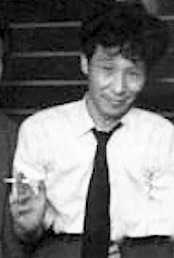Shōtarō Yasuoka
| Shōtarō Yasuoka | |
|---|---|
 | |
| Born |
May 30, 1920 Kōchi, Kōchi, Japan |
| Died |
January 26, 2013 (aged 92) Tokyo, Japan |
| Occupation | Author, novelist |
| Nationality | Japanese |
| Genres | Fiction |
Shōtarō Yasuoka (安岡 章太郎 Yasuoka Shōtarō, May 30, 1920 – January 26, 2013) was a Japanese writer.[1][2][3]
Biography
Yasuoka was born in pre-war Japan in Kōchi, Kōchi, but as the son of a veterinary corpsman in the Imperial Army, he spent most of his youth moving from one military post to another.[4] In 1944, he was conscripted and served briefly overseas.[1] After the war, he became ill with spinal caries, and it was "while he was bedridden with this disease that he began his writing career."[4] Yasuoka died in his home at age 92 in Tokyo, Japan.[3]
Awards
As an influential Japanese writer, Yasuoka's work has won him various prizes and awards. Notably, he received the Akutagawa Prize for Inki na tanoshimi (A Melancholy Pleasure, 1953) and Warui nakama (Bad Company, 1953); Kaihen no kōkei (A View by the Sea, 1959) won him the Noma Literary Prize; and his Maku ga orite kara (After the Curtain Fell, 1967) won the Mainichi Cultural Prize.[1] He also received the Yomiuri Literary Prize for Hate mo nai dōchūki (The Never-ending Traveler's Journal, 1996); and the Osaragi Jirō Prize for Kagamigawa (The Kagami River, 2000).[1]
A leading figure in post-war Japanese literature, in 2001 Yasuoka was recognized by the Japanese government as a Person of Cultural Merit.[5]
Literature
| Japanese title | English title | Year | English translation, year |
|---|---|---|---|
| 愛玩 "Aigan" |
Prized Possessions | 1952 | Edwin, McClellan, 1977 |
References
- ↑ 1.0 1.1 1.2 1.3 Jewel, Mark (2009-03-16). "Yasuoka Shōtarō". The Japanese Literature. Retrieved 2009-07-06.
- ↑ "Writer Yasuoka dies". Kyodo News. January 29, 2013. Archived from the original on 20 February 2013. Retrieved 29 January 2013.
- ↑ 3.0 3.1 Staff writer (January 30, 2013). "Postwar literary giant Yasuoka dies at 92". The Asahi Shimbun. Retrieved January 31, 2013.
- ↑ 4.0 4.1 "The Glass Slipper and Other Stories". Dalkey Archive Press. 2008. Retrieved 2009-09-09.
- ↑ "Cultural Highlights; From the Japanese Press (August 1–October 31, 2001)," Japan Foundation Newsletter, Vol. XXIX, No. 2, p. 7.
External links
- Shotaro Yasuoka at J'Lit Books from Japan (English)
- The Japanese Literature: Yasuoka Shōtarō
|